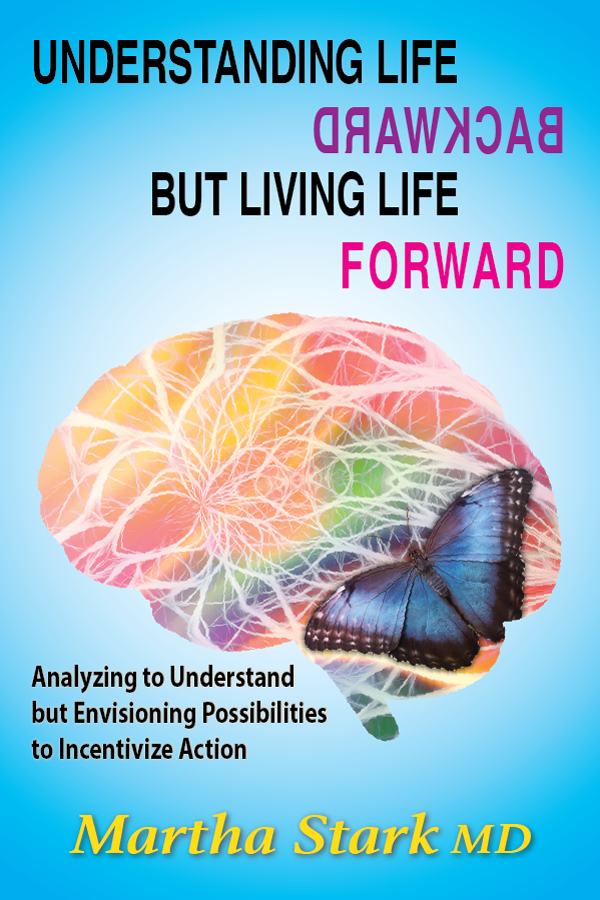
Understanding Life Backward but Living Life Forward
Publisher: International Psychotherapy Institute
Please provide your name and email to get free downloads.
Downloaded 7491 times since
Martha Stark’s most recent – and 9th – book features an action-based, solution-focused, future-oriented psychodynamic model that conceives of the mind as holding infinite potential and of memory as dynamic and continuously updating itself on the basis of new experience (whether real or simply envisioned).
A constructivist model at heart, the freshly minted Model 5 of Martha’s Psychodynamic Synergy Paradigm is a quantum-neuroscientific approach to healing that is informed by the groundbreaking discovery that when implicitly held traumatic memories are reactivated in an embodied fashion, the network of neural synapses encoding those procedurally organized memories will become deconsolidated for a time-limited period. This unlocking – fueled by repeated and dramatic juxtaposition of old bad learned expectations with new good envisioned possibilities – will create opportunity for both rewiring the brain and reprogramming the mind by way of therapeutic memory reconsolidation.
Indeed, over the course of the past two decades, a dedicated group of cognitive neuroscientists (Verkhratsky & Butt 2007; Dudai et al. 2015), ever intent upon teasing out the neural mechanisms underlying the dynamic nature of memory, have been using advanced neuroimaging techniques to deepen their understanding of the brain’s remarkable neuroplasticity, that is, the brain’s innate capacity continuously and adaptively to reorganize itself in response to ongoing environmental stimulation – if certain conditions are met.
More specifically, repeated embodied juxtaposition of the reactivated experience of something old and bad with the intentioned experience of something new and good will create decisive – and potentially transformational – mismatch experiences. If these mismatch experiences are repeated often enough, forcefully enough, and joltingly enough within the critical time frame of four to six hours, then these ongoing violations of conditioned expectation will eventually trigger energetic disentanglement of the patient’s toxic past from her present and quantum advance-ment of the patient from entrenched inaction to intentioned action as growth-impeding and disempowering narratives are replaced by growth-promoting and empowering ones.
When therapeutic memory reconsolidation updates a traumatic memory, what is it that changes and what is it that remains the same? Importantly, the fact of the event underlying the traumatic memory will not change, that is, the episodic memory itself will remain intact. What will change, however, will be the affective coloring of the experience, how the patient positions herself in relation to it, and the relational narrative she constructs about self, others, and the world as a result of it.
REFERENCES
Dudai Y, Karni A, Born J. 2015. The consolidation and transformation of memory. Neuron Oct 7;88(1):20-32.
Ecker B, Ticic R, Hulley L. 2013. A primer on memory reconsolidation and its psychotherapeutic use as a core process of profound change. The Neuropsychotherapist 1,82-99.
Feinstein D. 2019. Energy psychology: Efficacy, speed, mechanisms. Explore 15(5):340-351.
Stark M. 2021. Understanding Life Backward but Living It Forward (International Psychotherapy Institute eBook).
Verkhratsky A, Butt A. 2007. Glial Neurobiology. Marblehead, MA: John Wiley & Sons Inc.
Reviews
“Martha, I have never seen a more cogent, concise description of the reconsolidation process than in your first two pages! Anywhere. Congratulations! What I love as we get to page 4 is the conceptual flexibility of your Psychodynamic Synergy Paradigm. Whatever the phenomena that arises in the session, utilize the theoretical model that best fits it rather than trying to fit it into a limited theoretical model! A foundation for integrative psychotherapy beautifully articulated!”
“I just completed Dr. Martha Stark’s Intensive Training in Psychodynamic Psychotherapy – offered in May 2021 through the Department of Psychiatry at the Cambridge Health Alliance (CHA). To say that Dr. Martha Stark is a gift to the community of psychoanalytic thinkers, educators, and practitioners is an immense understatement. Dr. Stark’s bright enthusiasm and nuanced approach to material ranging from the classically psychoanalytic to the most modern and innovative not only is precise and edifying but also represents a rare, admirable, and much-needed intellectual bravery. One can only come away from Dr. Stark’s writings and teachings more comprehending of the interrelationship of many threads of psychoanalytic history, conceptualization, and practice. It is difficult to think of anyone whose scope of content is so broad and yet whose precision and animation bring material to life in such a clear and accessible manner. Dr. Stark’s concepts of “old-bad and new-good” as well as her concept of ‘here-and-then versus here-and-now’ are at once linguistically accessible and yet point to amongst the most profound and consequential psychoanalytic dynamics.”
Adam Rosen, PhD
“Thank you for this information and for all of your efforts in putting this course together for CHA faculty. I greatly appreciate the clarity and integration of different conceptual frameworks you have distilled into your “models of therapeutic action.” Your flexible thinking and pragmatic approach in my view reflects the reality of the available research into these frameworks of therapeutic change. Over the course of the years, I have tried to work with a variety of therapeutic approaches in my own clinical practice, but, to this point, had not been able, as you have so beautifully done, to construct a clear conceptual framework for integrating them. Your efforts are outstanding and much appreciated, especially your curiosity and openness to new ways of thinking about what we do as psychotherapists.”
Ayelet Barkai, MD
“Thank you so much for the wonderful Intensive Psychodynamic Psychotherapy course you offered to CHA! Despite my hectic schedule last and this month, your “bite-sized” segments made it possible for me to fit in the various parts of your course when I had some time free. I’m so glad I did! I enjoyed the course very much and am finding it very useful in both my own clinical practice and my supervising! Many thanks!”
Irene Merwin, PsyD
Please enjoy our free e-books, whether you’re a student just starting out, or an established professional who can afford to donate a few dollars to keep this project going.

